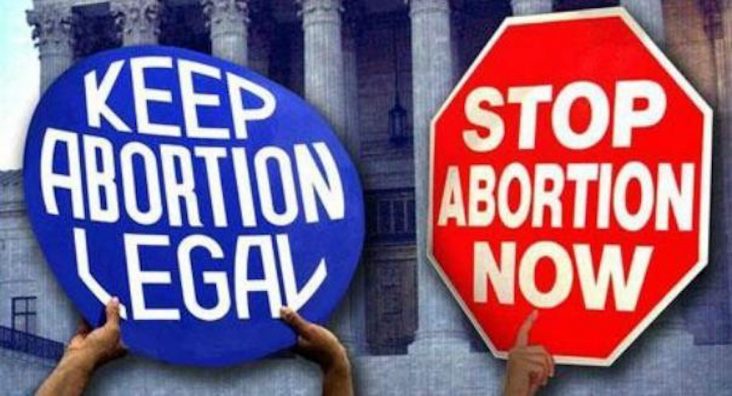U.S. Supreme Court overturns Roe v. Wade; pushes abortion regulation to the states
by June 24, 2022 9:31 am 797 views

The U.S. Supreme Court on Friday (June 24) upheld a Mississippi law banning abortion and in doing so overturned the right to abortion in Roe v. Wade, and also overturned Planned Parenthood v. Casey, which also provides national abortion access.
The ruling (Dobbs v. Jackson Women’s Health Organization) is the first time in the Court’s history it has reversed a ruling that granted a constitutional right. At least 13 U.S. states, including Arkansas, have trigger laws that make abortion illegal if the court were to reverse Roe.
In 2019, ACT 180, a “trigger” statute was signed into law by Gov. Asa Hutchinson. The sponsor of the legislation, Sen. Jason Rapert, R-Conway, included language that this would become law if the U.S. Supreme Court overturned Roe.
Friday’s ruling does not outlaw abortion but effectively pushes legislation on the issue to the states. According to Politico, Kentucky, Louisiana and South Dakota are the only states with laws that trigger immediately to ban most abortions now that Roe is overturned. Many states have trigger laws that require some type of minimal action – like the signature of a governor – or 30-day window for abortion to be broadly illegal.
In Arkansas, the ban requires the Arkansas Attorney General to certify that Roe has been effectively overturned. Arkansas Attorney General Leslie Rutledge said she would sign the certification 2 p.m. at a Friday event. An estimated 26 states will immediately or soon ban abortion.
COURT OPINION
In writing the lengthy majority opinion, Justice Samuel Alito said the ruling “properly returns” the matter to citizens to determine through “democratic self-government.”
“In my judgment, on the issue of abortion, the Constitution is neither pro-life nor pro-choice. The Constitution is neutral, and this Court likewise must be scrupulously neutral. The Court today properly heeds the constitutional principle of judicial neutrality and returns the issue of abortion to the people and their elected representatives in the democratic process,” Alito wrote.
In addition to Alito, Justices concurring in the majority were Chief Justice John Roberts, and Associate Justices Amy Coney Barrett, Neil Gorsuch, Brett Kavanaugh and Clarence Thomas. Dissenting were Associate Justices Stephen Breyer, Elena Kagan and Sonia Sotomayor.
In the dissent, written by Breyer, the three justices said the Court wrongfully decided to overturn the “balance” between fetal viability and a woman’s rights and her reproductive health.
“Today, the Court discards that balance. It says that from the very moment of fertilization, a woman has no rights to speak of. A State can force her to bring a pregnancy to term, even at the steepest personal and familial costs. An abortion restriction, the majority holds, is permissible whenever rational, the lowest level of scrutiny known to the law. And because, as the Court has often stated, protecting fetal life is rational, States will feel free to enact all manner of restrictions. The Mississippi law at issue here bars abortions after the 15th week of pregnancy. Under the majority’s ruling, though, another State’s law could do so after ten weeks, or five or three or one—or, again, from the moment of fertilization,” Breyer noted.
Link here for the PDF of the ruling.
REACTIONS
Arkansas Gov. Asa Hutchinson, likely a 2024 U.S. presidential candidate, praised Friday’s ruling.
“For decades I have said Roe v. Wade was wrongly decided. Today, the Supreme Court overturned the abortion ruling and returned the issue to the states. Arkansas is a pro-life state, and we are not able to protect life,” Hutchinson noted in a Twitter post.
U.S. Sen. John Boozman, R-Ark., the state’s senior senator, said the ruling rightly takes the issue out of the hands of judges and gives the decision back to the American people.
“The Supreme Court’s decision to affirm there is no constitutional right to indiscriminately sacrifice the lives of children in their mothers’ wombs is the culmination of decades of work to correct the tragic, deadly lie that unborn babies are expendable and undeserving of protection,” Boozman said in a statement. “With this ruling, the American people will finally have the opportunity to enact their will on this issue instead of unelected judges in Washington, D.C. I am proud of Arkansas’s steadfast commitment to defend the sanctity, dignity and value of every human life, including vulnerable children who deserve our compassion and care.”
State Rep. Ashley Hudson, D-Little Rock, said the ruling means rape victims in Arkansas will soon be blocked from having an abortion.
“Not only does the overturning of Roe mean access to safe abortion will cease to exist in Arkansas, it means the state is granting new rights to rapists and violent sex offenders to force their victim to carry a rape-caused pregnancy to term. Arkansas is home to the second highest rape rate in the country, and for lawmakers to minimize the effect the trigger law will have on women who have been raped is outrageous,” Hudson said.
Colorado is one state that has moved to protect abortion rights. Colorado Gov. Jared Polis in April signed the Reproductive Health Equity Act that ensures reproductive rights in that state.
Colorado Governor Jared Polis released a statement following the alarming decision by the U.S. Supreme Court to strip away the freedom to end a pregnancy and the right to an abortion from millions of Americans, overturning decades of legal precedent, and endangering the rights of future generations.
“Because of my administration and Democratic leadership in the legislature, Coloradans don’t have to worry because our rights are still protected today despite the unfortunate reality that the U.S. Supreme just rolled those freedoms back for millions of Americans in other states. In Colorado, we will continue to choose freedom and we stand against government control over our bodies,” Polis said in a statement.
